Entrepreneurship Report: Ventures, Skills, and Brexit Impact
VerifiedAdded on 2019/12/18
|13
|4590
|1257
Report
AI Summary
This report delves into the multifaceted world of entrepreneurship, beginning with an introduction to the concept and its role in the modern business landscape. It explores various types of entrepreneurial ventures, including lifestyle, serial, female, and social enterprises, highlighting their similarities and differences. The report then examines the significance of micro and small businesses within the economy, outlining their impact on employment, per capita income, and overall economic growth. Furthermore, it analyzes the effects of Brexit on small businesses and startups in the United Kingdom, discussing the challenges and opportunities that have emerged. The report also identifies key characteristics, traits, and skills of successful entrepreneurs, alongside an exploration of the rewards and drawbacks associated with entrepreneurial endeavors. It provides a comprehensive overview of the subject matter, offering valuable insights into the dynamic field of entrepreneurship.

ENTREPRENEURSHIP
Paraphrase This Document
Need a fresh take? Get an instant paraphrase of this document with our AI Paraphraser
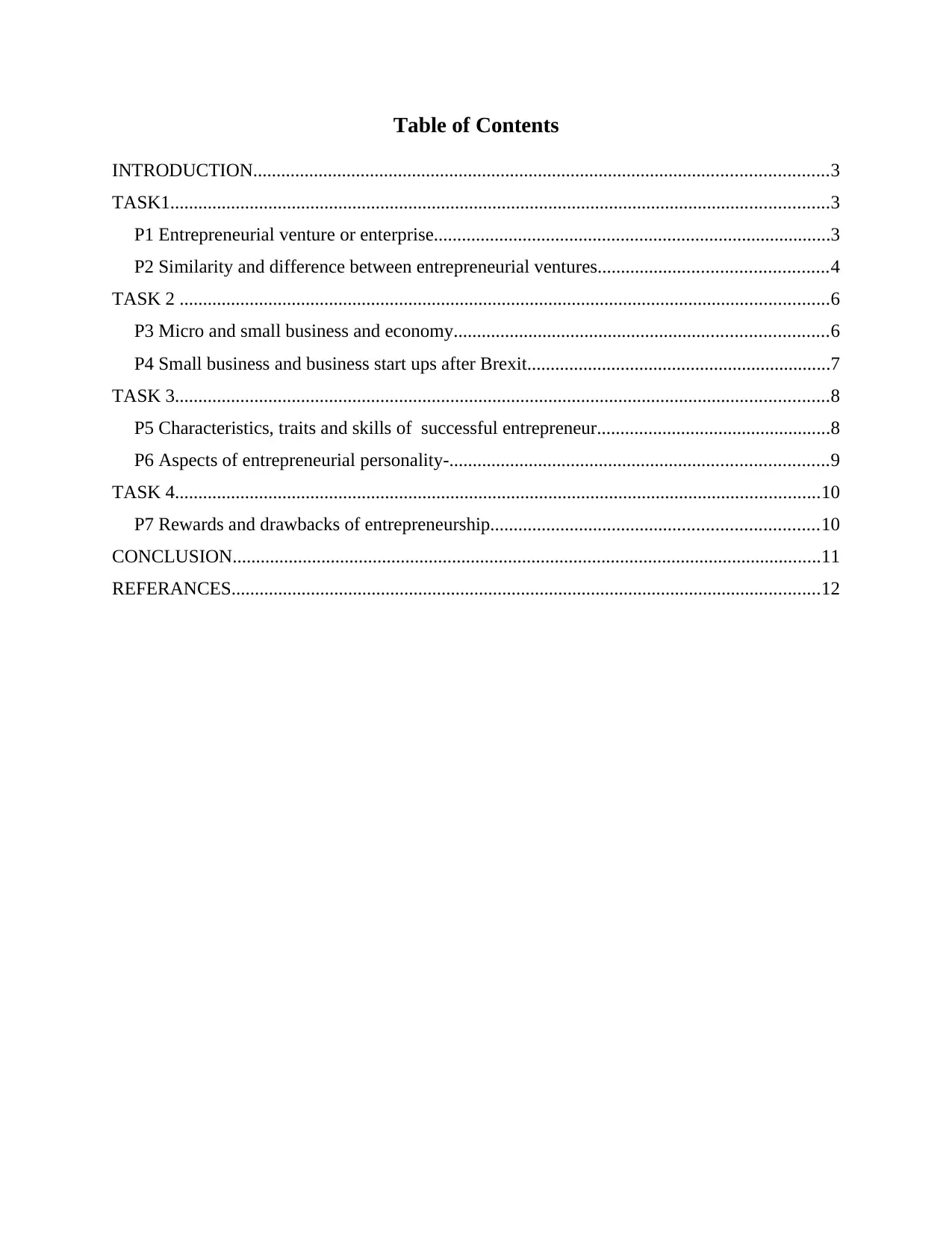
Table of Contents
INTRODUCTION...........................................................................................................................3
TASK1.............................................................................................................................................3
P1 Entrepreneurial venture or enterprise.....................................................................................3
P2 Similarity and difference between entrepreneurial ventures.................................................4
TASK 2 ...........................................................................................................................................6
P3 Micro and small business and economy................................................................................6
P4 Small business and business start ups after Brexit.................................................................7
TASK 3............................................................................................................................................8
P5 Characteristics, traits and skills of successful entrepreneur..................................................8
P6 Aspects of entrepreneurial personality-.................................................................................9
TASK 4..........................................................................................................................................10
P7 Rewards and drawbacks of entrepreneurship......................................................................10
CONCLUSION..............................................................................................................................11
REFERANCES..............................................................................................................................12
INTRODUCTION...........................................................................................................................3
TASK1.............................................................................................................................................3
P1 Entrepreneurial venture or enterprise.....................................................................................3
P2 Similarity and difference between entrepreneurial ventures.................................................4
TASK 2 ...........................................................................................................................................6
P3 Micro and small business and economy................................................................................6
P4 Small business and business start ups after Brexit.................................................................7
TASK 3............................................................................................................................................8
P5 Characteristics, traits and skills of successful entrepreneur..................................................8
P6 Aspects of entrepreneurial personality-.................................................................................9
TASK 4..........................................................................................................................................10
P7 Rewards and drawbacks of entrepreneurship......................................................................10
CONCLUSION..............................................................................................................................11
REFERANCES..............................................................................................................................12
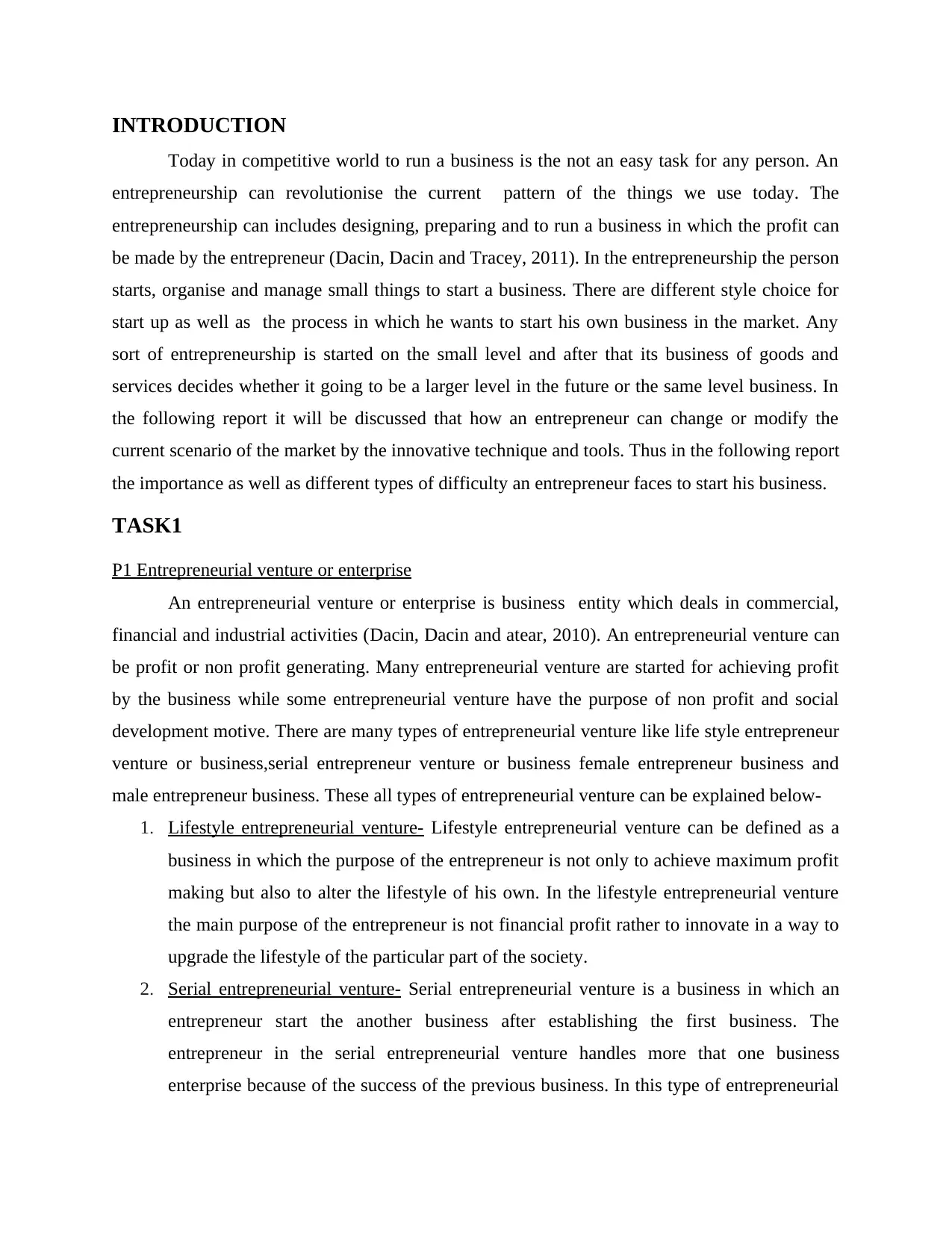
INTRODUCTION
Today in competitive world to run a business is the not an easy task for any person. An
entrepreneurship can revolutionise the current pattern of the things we use today. The
entrepreneurship can includes designing, preparing and to run a business in which the profit can
be made by the entrepreneur (Dacin, Dacin and Tracey, 2011). In the entrepreneurship the person
starts, organise and manage small things to start a business. There are different style choice for
start up as well as the process in which he wants to start his own business in the market. Any
sort of entrepreneurship is started on the small level and after that its business of goods and
services decides whether it going to be a larger level in the future or the same level business. In
the following report it will be discussed that how an entrepreneur can change or modify the
current scenario of the market by the innovative technique and tools. Thus in the following report
the importance as well as different types of difficulty an entrepreneur faces to start his business.
TASK1
P1 Entrepreneurial venture or enterprise
An entrepreneurial venture or enterprise is business entity which deals in commercial,
financial and industrial activities (Dacin, Dacin and atear, 2010). An entrepreneurial venture can
be profit or non profit generating. Many entrepreneurial venture are started for achieving profit
by the business while some entrepreneurial venture have the purpose of non profit and social
development motive. There are many types of entrepreneurial venture like life style entrepreneur
venture or business,serial entrepreneur venture or business female entrepreneur business and
male entrepreneur business. These all types of entrepreneurial venture can be explained below-
1. Lifestyle entrepreneurial venture- Lifestyle entrepreneurial venture can be defined as a
business in which the purpose of the entrepreneur is not only to achieve maximum profit
making but also to alter the lifestyle of his own. In the lifestyle entrepreneurial venture
the main purpose of the entrepreneur is not financial profit rather to innovate in a way to
upgrade the lifestyle of the particular part of the society.
2. Serial entrepreneurial venture- Serial entrepreneurial venture is a business in which an
entrepreneur start the another business after establishing the first business. The
entrepreneur in the serial entrepreneurial venture handles more that one business
enterprise because of the success of the previous business. In this type of entrepreneurial
Today in competitive world to run a business is the not an easy task for any person. An
entrepreneurship can revolutionise the current pattern of the things we use today. The
entrepreneurship can includes designing, preparing and to run a business in which the profit can
be made by the entrepreneur (Dacin, Dacin and Tracey, 2011). In the entrepreneurship the person
starts, organise and manage small things to start a business. There are different style choice for
start up as well as the process in which he wants to start his own business in the market. Any
sort of entrepreneurship is started on the small level and after that its business of goods and
services decides whether it going to be a larger level in the future or the same level business. In
the following report it will be discussed that how an entrepreneur can change or modify the
current scenario of the market by the innovative technique and tools. Thus in the following report
the importance as well as different types of difficulty an entrepreneur faces to start his business.
TASK1
P1 Entrepreneurial venture or enterprise
An entrepreneurial venture or enterprise is business entity which deals in commercial,
financial and industrial activities (Dacin, Dacin and atear, 2010). An entrepreneurial venture can
be profit or non profit generating. Many entrepreneurial venture are started for achieving profit
by the business while some entrepreneurial venture have the purpose of non profit and social
development motive. There are many types of entrepreneurial venture like life style entrepreneur
venture or business,serial entrepreneur venture or business female entrepreneur business and
male entrepreneur business. These all types of entrepreneurial venture can be explained below-
1. Lifestyle entrepreneurial venture- Lifestyle entrepreneurial venture can be defined as a
business in which the purpose of the entrepreneur is not only to achieve maximum profit
making but also to alter the lifestyle of his own. In the lifestyle entrepreneurial venture
the main purpose of the entrepreneur is not financial profit rather to innovate in a way to
upgrade the lifestyle of the particular part of the society.
2. Serial entrepreneurial venture- Serial entrepreneurial venture is a business in which an
entrepreneur start the another business after establishing the first business. The
entrepreneur in the serial entrepreneurial venture handles more that one business
enterprise because of the success of the previous business. In this type of entrepreneurial
⊘ This is a preview!⊘
Do you want full access?
Subscribe today to unlock all pages.

Trusted by 1+ million students worldwide
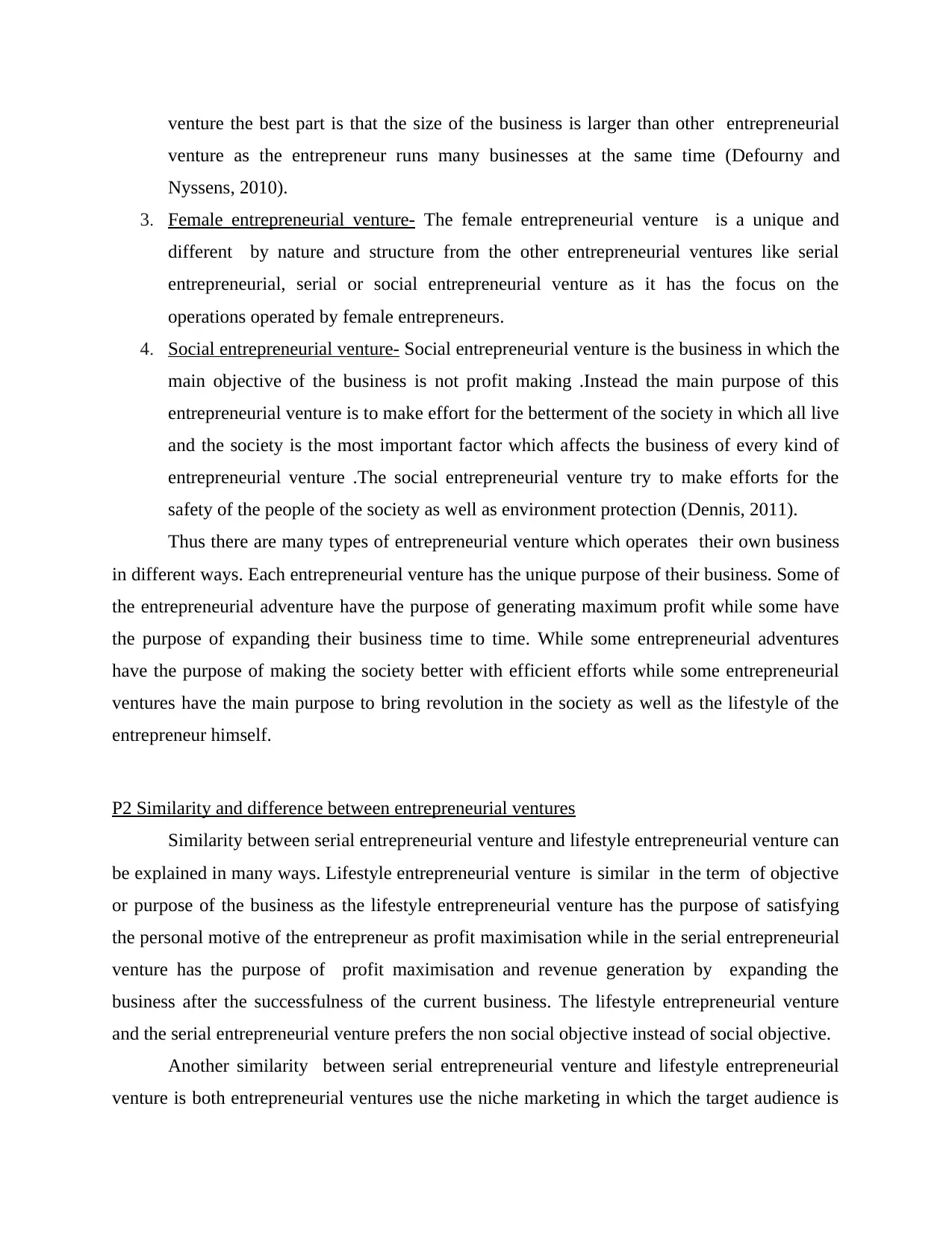
venture the best part is that the size of the business is larger than other entrepreneurial
venture as the entrepreneur runs many businesses at the same time (Defourny and
Nyssens, 2010).
3. Female entrepreneurial venture- The female entrepreneurial venture is a unique and
different by nature and structure from the other entrepreneurial ventures like serial
entrepreneurial, serial or social entrepreneurial venture as it has the focus on the
operations operated by female entrepreneurs.
4. Social entrepreneurial venture- Social entrepreneurial venture is the business in which the
main objective of the business is not profit making .Instead the main purpose of this
entrepreneurial venture is to make effort for the betterment of the society in which all live
and the society is the most important factor which affects the business of every kind of
entrepreneurial venture .The social entrepreneurial venture try to make efforts for the
safety of the people of the society as well as environment protection (Dennis, 2011).
Thus there are many types of entrepreneurial venture which operates their own business
in different ways. Each entrepreneurial venture has the unique purpose of their business. Some of
the entrepreneurial adventure have the purpose of generating maximum profit while some have
the purpose of expanding their business time to time. While some entrepreneurial adventures
have the purpose of making the society better with efficient efforts while some entrepreneurial
ventures have the main purpose to bring revolution in the society as well as the lifestyle of the
entrepreneur himself.
P2 Similarity and difference between entrepreneurial ventures
Similarity between serial entrepreneurial venture and lifestyle entrepreneurial venture can
be explained in many ways. Lifestyle entrepreneurial venture is similar in the term of objective
or purpose of the business as the lifestyle entrepreneurial venture has the purpose of satisfying
the personal motive of the entrepreneur as profit maximisation while in the serial entrepreneurial
venture has the purpose of profit maximisation and revenue generation by expanding the
business after the successfulness of the current business. The lifestyle entrepreneurial venture
and the serial entrepreneurial venture prefers the non social objective instead of social objective.
Another similarity between serial entrepreneurial venture and lifestyle entrepreneurial
venture is both entrepreneurial ventures use the niche marketing in which the target audience is
venture as the entrepreneur runs many businesses at the same time (Defourny and
Nyssens, 2010).
3. Female entrepreneurial venture- The female entrepreneurial venture is a unique and
different by nature and structure from the other entrepreneurial ventures like serial
entrepreneurial, serial or social entrepreneurial venture as it has the focus on the
operations operated by female entrepreneurs.
4. Social entrepreneurial venture- Social entrepreneurial venture is the business in which the
main objective of the business is not profit making .Instead the main purpose of this
entrepreneurial venture is to make effort for the betterment of the society in which all live
and the society is the most important factor which affects the business of every kind of
entrepreneurial venture .The social entrepreneurial venture try to make efforts for the
safety of the people of the society as well as environment protection (Dennis, 2011).
Thus there are many types of entrepreneurial venture which operates their own business
in different ways. Each entrepreneurial venture has the unique purpose of their business. Some of
the entrepreneurial adventure have the purpose of generating maximum profit while some have
the purpose of expanding their business time to time. While some entrepreneurial adventures
have the purpose of making the society better with efficient efforts while some entrepreneurial
ventures have the main purpose to bring revolution in the society as well as the lifestyle of the
entrepreneur himself.
P2 Similarity and difference between entrepreneurial ventures
Similarity between serial entrepreneurial venture and lifestyle entrepreneurial venture can
be explained in many ways. Lifestyle entrepreneurial venture is similar in the term of objective
or purpose of the business as the lifestyle entrepreneurial venture has the purpose of satisfying
the personal motive of the entrepreneur as profit maximisation while in the serial entrepreneurial
venture has the purpose of profit maximisation and revenue generation by expanding the
business after the successfulness of the current business. The lifestyle entrepreneurial venture
and the serial entrepreneurial venture prefers the non social objective instead of social objective.
Another similarity between serial entrepreneurial venture and lifestyle entrepreneurial
venture is both entrepreneurial ventures use the niche marketing in which the target audience is
Paraphrase This Document
Need a fresh take? Get an instant paraphrase of this document with our AI Paraphraser
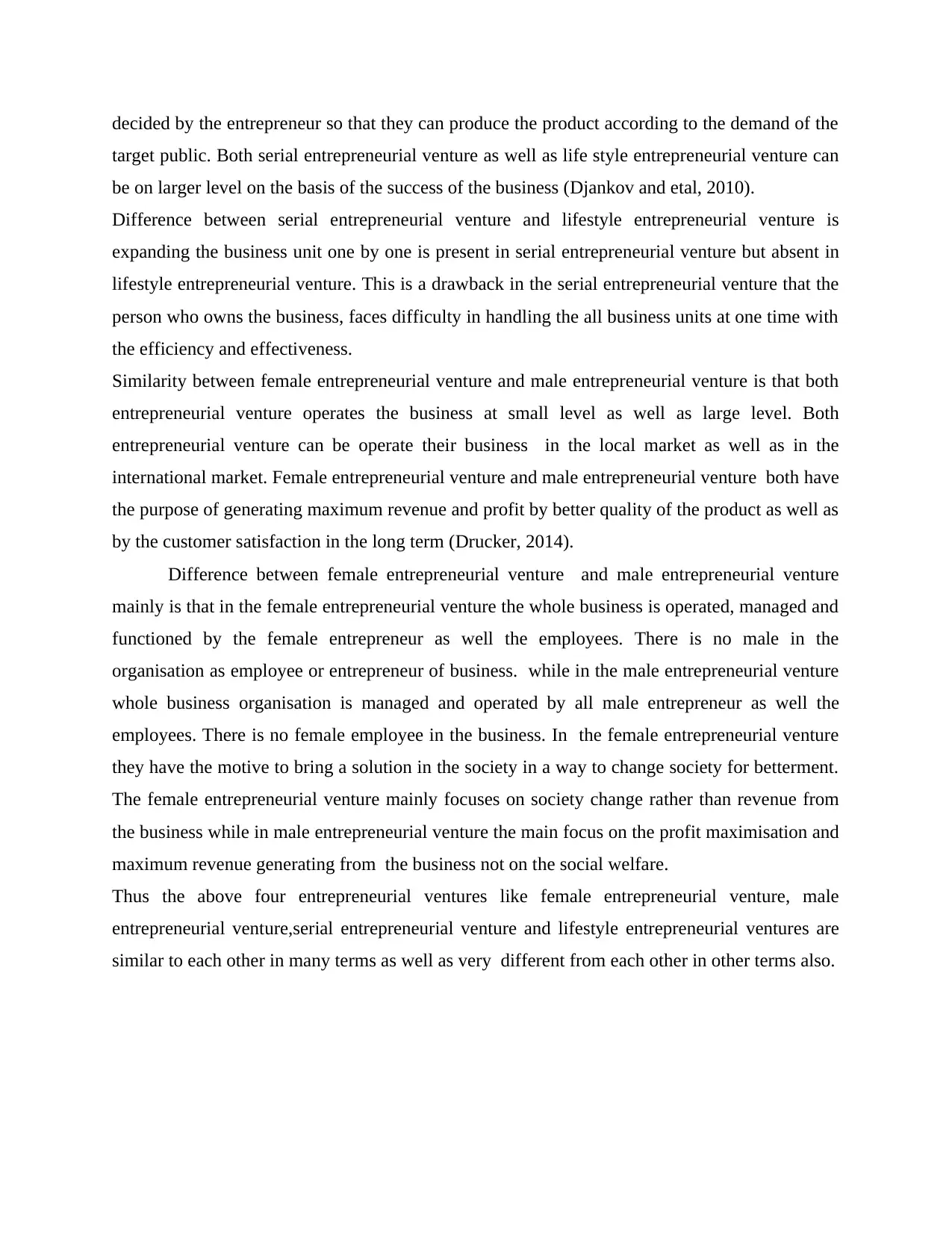
decided by the entrepreneur so that they can produce the product according to the demand of the
target public. Both serial entrepreneurial venture as well as life style entrepreneurial venture can
be on larger level on the basis of the success of the business (Djankov and etal, 2010).
Difference between serial entrepreneurial venture and lifestyle entrepreneurial venture is
expanding the business unit one by one is present in serial entrepreneurial venture but absent in
lifestyle entrepreneurial venture. This is a drawback in the serial entrepreneurial venture that the
person who owns the business, faces difficulty in handling the all business units at one time with
the efficiency and effectiveness.
Similarity between female entrepreneurial venture and male entrepreneurial venture is that both
entrepreneurial venture operates the business at small level as well as large level. Both
entrepreneurial venture can be operate their business in the local market as well as in the
international market. Female entrepreneurial venture and male entrepreneurial venture both have
the purpose of generating maximum revenue and profit by better quality of the product as well as
by the customer satisfaction in the long term (Drucker, 2014).
Difference between female entrepreneurial venture and male entrepreneurial venture
mainly is that in the female entrepreneurial venture the whole business is operated, managed and
functioned by the female entrepreneur as well the employees. There is no male in the
organisation as employee or entrepreneur of business. while in the male entrepreneurial venture
whole business organisation is managed and operated by all male entrepreneur as well the
employees. There is no female employee in the business. In the female entrepreneurial venture
they have the motive to bring a solution in the society in a way to change society for betterment.
The female entrepreneurial venture mainly focuses on society change rather than revenue from
the business while in male entrepreneurial venture the main focus on the profit maximisation and
maximum revenue generating from the business not on the social welfare.
Thus the above four entrepreneurial ventures like female entrepreneurial venture, male
entrepreneurial venture,serial entrepreneurial venture and lifestyle entrepreneurial ventures are
similar to each other in many terms as well as very different from each other in other terms also.
target public. Both serial entrepreneurial venture as well as life style entrepreneurial venture can
be on larger level on the basis of the success of the business (Djankov and etal, 2010).
Difference between serial entrepreneurial venture and lifestyle entrepreneurial venture is
expanding the business unit one by one is present in serial entrepreneurial venture but absent in
lifestyle entrepreneurial venture. This is a drawback in the serial entrepreneurial venture that the
person who owns the business, faces difficulty in handling the all business units at one time with
the efficiency and effectiveness.
Similarity between female entrepreneurial venture and male entrepreneurial venture is that both
entrepreneurial venture operates the business at small level as well as large level. Both
entrepreneurial venture can be operate their business in the local market as well as in the
international market. Female entrepreneurial venture and male entrepreneurial venture both have
the purpose of generating maximum revenue and profit by better quality of the product as well as
by the customer satisfaction in the long term (Drucker, 2014).
Difference between female entrepreneurial venture and male entrepreneurial venture
mainly is that in the female entrepreneurial venture the whole business is operated, managed and
functioned by the female entrepreneur as well the employees. There is no male in the
organisation as employee or entrepreneur of business. while in the male entrepreneurial venture
whole business organisation is managed and operated by all male entrepreneur as well the
employees. There is no female employee in the business. In the female entrepreneurial venture
they have the motive to bring a solution in the society in a way to change society for betterment.
The female entrepreneurial venture mainly focuses on society change rather than revenue from
the business while in male entrepreneurial venture the main focus on the profit maximisation and
maximum revenue generating from the business not on the social welfare.
Thus the above four entrepreneurial ventures like female entrepreneurial venture, male
entrepreneurial venture,serial entrepreneurial venture and lifestyle entrepreneurial ventures are
similar to each other in many terms as well as very different from each other in other terms also.
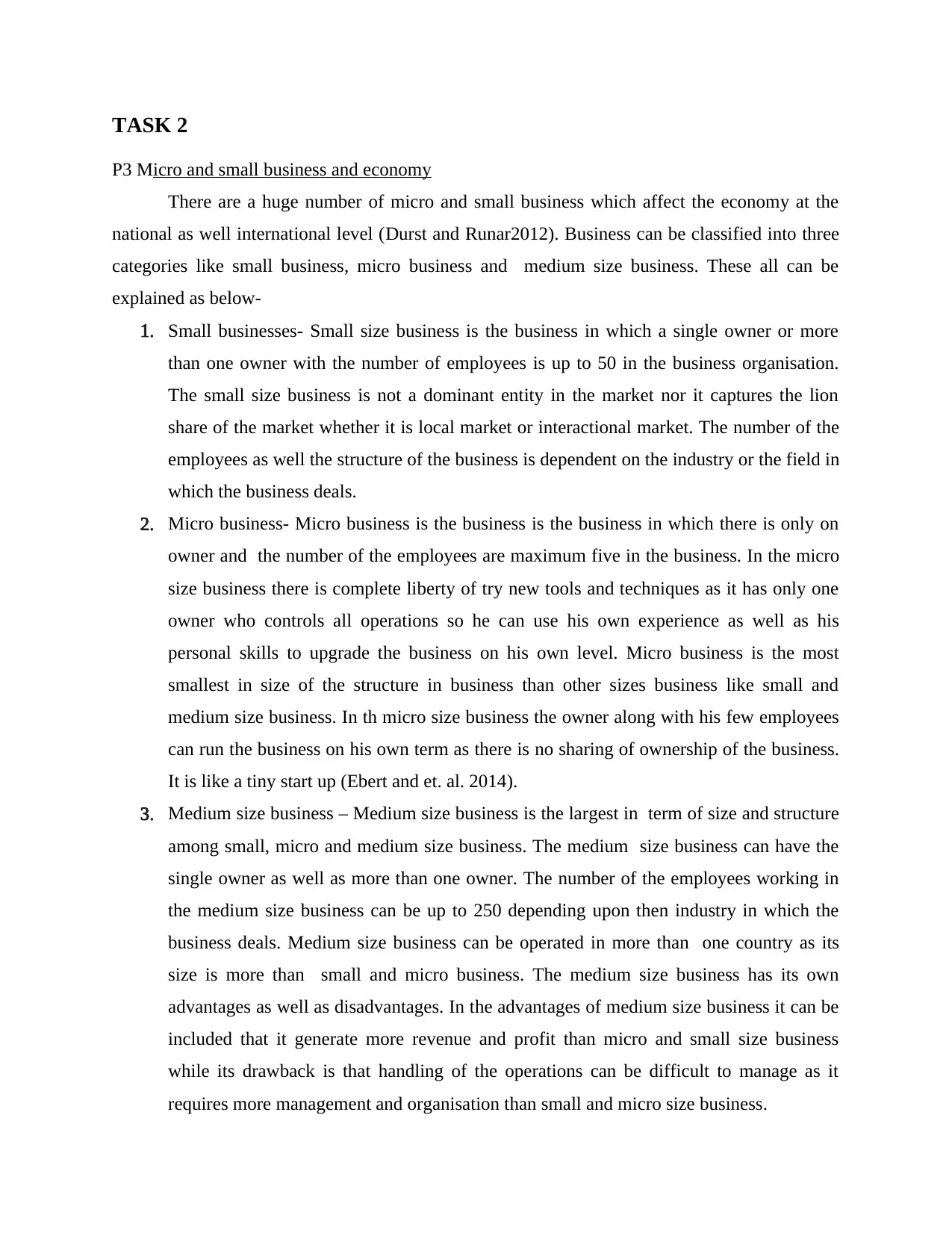
TASK 2
P3 Micro and small business and economy
There are a huge number of micro and small business which affect the economy at the
national as well international level (Durst and Runar2012). Business can be classified into three
categories like small business, micro business and medium size business. These all can be
explained as below-
1. Small businesses- Small size business is the business in which a single owner or more
than one owner with the number of employees is up to 50 in the business organisation.
The small size business is not a dominant entity in the market nor it captures the lion
share of the market whether it is local market or interactional market. The number of the
employees as well the structure of the business is dependent on the industry or the field in
which the business deals.
2. Micro business- Micro business is the business is the business in which there is only on
owner and the number of the employees are maximum five in the business. In the micro
size business there is complete liberty of try new tools and techniques as it has only one
owner who controls all operations so he can use his own experience as well as his
personal skills to upgrade the business on his own level. Micro business is the most
smallest in size of the structure in business than other sizes business like small and
medium size business. In th micro size business the owner along with his few employees
can run the business on his own term as there is no sharing of ownership of the business.
It is like a tiny start up (Ebert and et. al. 2014).
3. Medium size business – Medium size business is the largest in term of size and structure
among small, micro and medium size business. The medium size business can have the
single owner as well as more than one owner. The number of the employees working in
the medium size business can be up to 250 depending upon then industry in which the
business deals. Medium size business can be operated in more than one country as its
size is more than small and micro business. The medium size business has its own
advantages as well as disadvantages. In the advantages of medium size business it can be
included that it generate more revenue and profit than micro and small size business
while its drawback is that handling of the operations can be difficult to manage as it
requires more management and organisation than small and micro size business.
P3 Micro and small business and economy
There are a huge number of micro and small business which affect the economy at the
national as well international level (Durst and Runar2012). Business can be classified into three
categories like small business, micro business and medium size business. These all can be
explained as below-
1. Small businesses- Small size business is the business in which a single owner or more
than one owner with the number of employees is up to 50 in the business organisation.
The small size business is not a dominant entity in the market nor it captures the lion
share of the market whether it is local market or interactional market. The number of the
employees as well the structure of the business is dependent on the industry or the field in
which the business deals.
2. Micro business- Micro business is the business is the business in which there is only on
owner and the number of the employees are maximum five in the business. In the micro
size business there is complete liberty of try new tools and techniques as it has only one
owner who controls all operations so he can use his own experience as well as his
personal skills to upgrade the business on his own level. Micro business is the most
smallest in size of the structure in business than other sizes business like small and
medium size business. In th micro size business the owner along with his few employees
can run the business on his own term as there is no sharing of ownership of the business.
It is like a tiny start up (Ebert and et. al. 2014).
3. Medium size business – Medium size business is the largest in term of size and structure
among small, micro and medium size business. The medium size business can have the
single owner as well as more than one owner. The number of the employees working in
the medium size business can be up to 250 depending upon then industry in which the
business deals. Medium size business can be operated in more than one country as its
size is more than small and micro business. The medium size business has its own
advantages as well as disadvantages. In the advantages of medium size business it can be
included that it generate more revenue and profit than micro and small size business
while its drawback is that handling of the operations can be difficult to manage as it
requires more management and organisation than small and micro size business.
⊘ This is a preview!⊘
Do you want full access?
Subscribe today to unlock all pages.

Trusted by 1+ million students worldwide
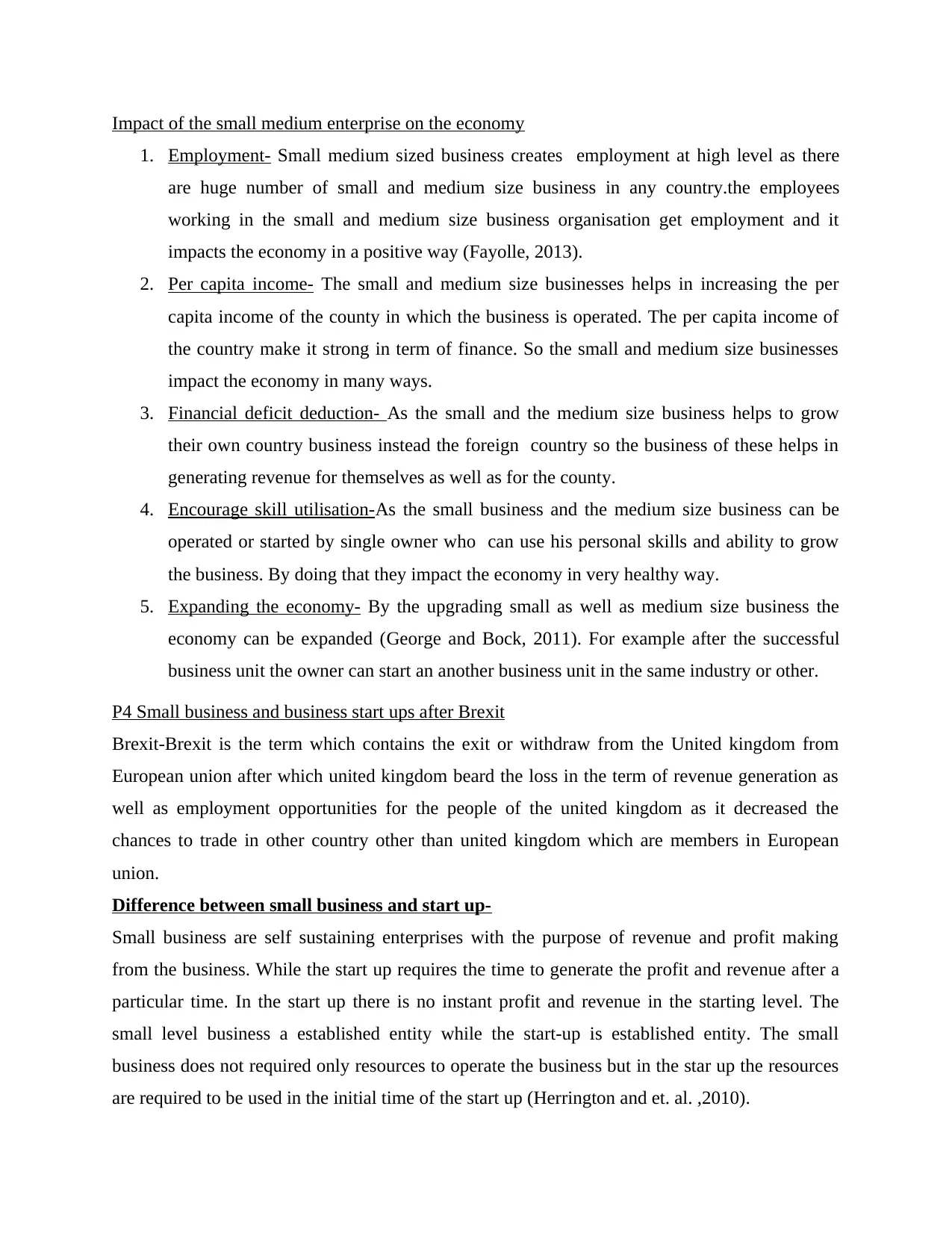
Impact of the small medium enterprise on the economy
1. Employment- Small medium sized business creates employment at high level as there
are huge number of small and medium size business in any country.the employees
working in the small and medium size business organisation get employment and it
impacts the economy in a positive way (Fayolle, 2013).
2. Per capita income- The small and medium size businesses helps in increasing the per
capita income of the county in which the business is operated. The per capita income of
the country make it strong in term of finance. So the small and medium size businesses
impact the economy in many ways.
3. Financial deficit deduction- As the small and the medium size business helps to grow
their own country business instead the foreign country so the business of these helps in
generating revenue for themselves as well as for the county.
4. Encourage skill utilisation-As the small business and the medium size business can be
operated or started by single owner who can use his personal skills and ability to grow
the business. By doing that they impact the economy in very healthy way.
5. Expanding the economy- By the upgrading small as well as medium size business the
economy can be expanded (George and Bock, 2011). For example after the successful
business unit the owner can start an another business unit in the same industry or other.
P4 Small business and business start ups after Brexit
Brexit-Brexit is the term which contains the exit or withdraw from the United kingdom from
European union after which united kingdom beard the loss in the term of revenue generation as
well as employment opportunities for the people of the united kingdom as it decreased the
chances to trade in other country other than united kingdom which are members in European
union.
Difference between small business and start up-
Small business are self sustaining enterprises with the purpose of revenue and profit making
from the business. While the start up requires the time to generate the profit and revenue after a
particular time. In the start up there is no instant profit and revenue in the starting level. The
small level business a established entity while the start-up is established entity. The small
business does not required only resources to operate the business but in the star up the resources
are required to be used in the initial time of the start up (Herrington and et. al. ,2010).
1. Employment- Small medium sized business creates employment at high level as there
are huge number of small and medium size business in any country.the employees
working in the small and medium size business organisation get employment and it
impacts the economy in a positive way (Fayolle, 2013).
2. Per capita income- The small and medium size businesses helps in increasing the per
capita income of the county in which the business is operated. The per capita income of
the country make it strong in term of finance. So the small and medium size businesses
impact the economy in many ways.
3. Financial deficit deduction- As the small and the medium size business helps to grow
their own country business instead the foreign country so the business of these helps in
generating revenue for themselves as well as for the county.
4. Encourage skill utilisation-As the small business and the medium size business can be
operated or started by single owner who can use his personal skills and ability to grow
the business. By doing that they impact the economy in very healthy way.
5. Expanding the economy- By the upgrading small as well as medium size business the
economy can be expanded (George and Bock, 2011). For example after the successful
business unit the owner can start an another business unit in the same industry or other.
P4 Small business and business start ups after Brexit
Brexit-Brexit is the term which contains the exit or withdraw from the United kingdom from
European union after which united kingdom beard the loss in the term of revenue generation as
well as employment opportunities for the people of the united kingdom as it decreased the
chances to trade in other country other than united kingdom which are members in European
union.
Difference between small business and start up-
Small business are self sustaining enterprises with the purpose of revenue and profit making
from the business. While the start up requires the time to generate the profit and revenue after a
particular time. In the start up there is no instant profit and revenue in the starting level. The
small level business a established entity while the start-up is established entity. The small
business does not required only resources to operate the business but in the star up the resources
are required to be used in the initial time of the start up (Herrington and et. al. ,2010).
Paraphrase This Document
Need a fresh take? Get an instant paraphrase of this document with our AI Paraphraser
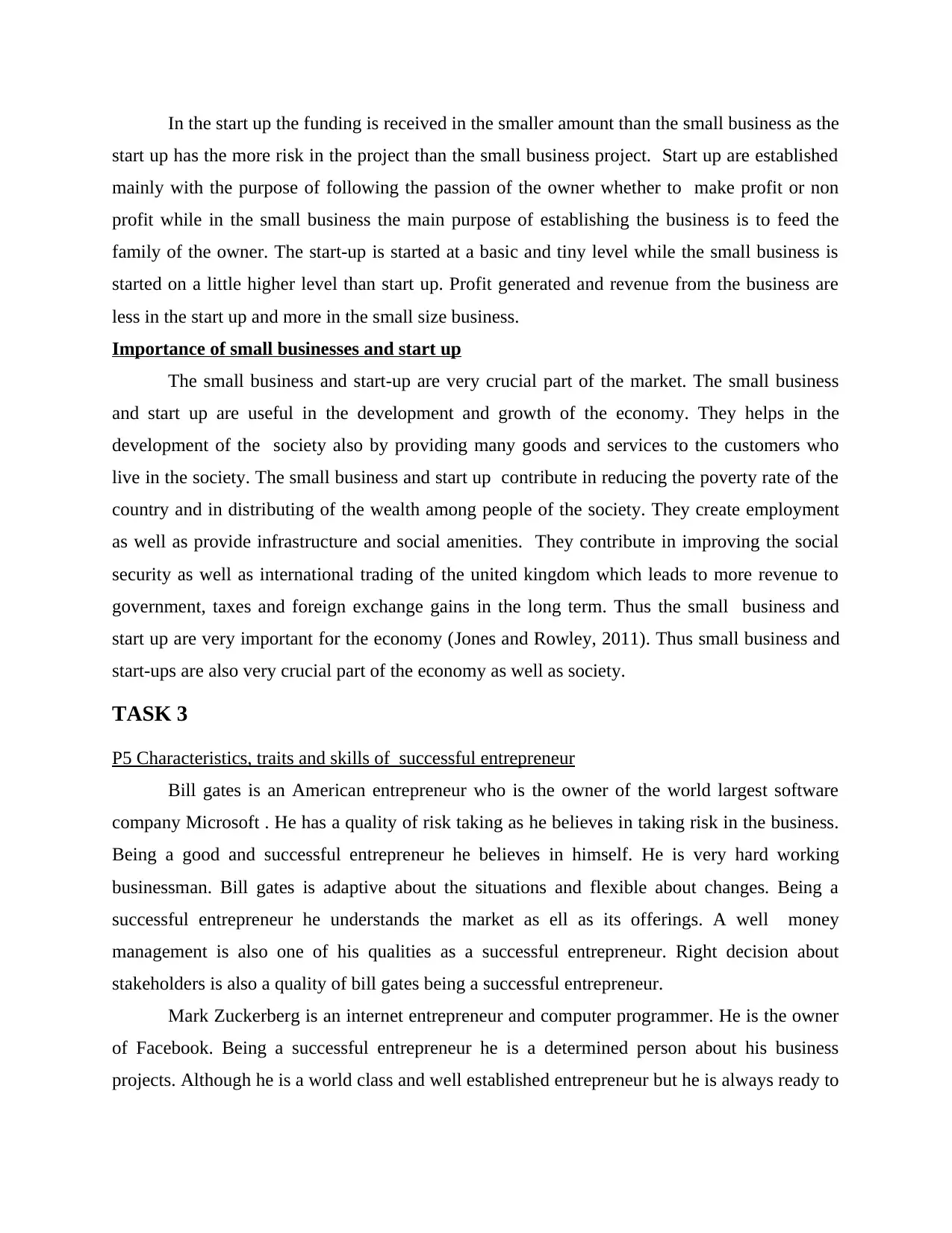
In the start up the funding is received in the smaller amount than the small business as the
start up has the more risk in the project than the small business project. Start up are established
mainly with the purpose of following the passion of the owner whether to make profit or non
profit while in the small business the main purpose of establishing the business is to feed the
family of the owner. The start-up is started at a basic and tiny level while the small business is
started on a little higher level than start up. Profit generated and revenue from the business are
less in the start up and more in the small size business.
Importance of small businesses and start up
The small business and start-up are very crucial part of the market. The small business
and start up are useful in the development and growth of the economy. They helps in the
development of the society also by providing many goods and services to the customers who
live in the society. The small business and start up contribute in reducing the poverty rate of the
country and in distributing of the wealth among people of the society. They create employment
as well as provide infrastructure and social amenities. They contribute in improving the social
security as well as international trading of the united kingdom which leads to more revenue to
government, taxes and foreign exchange gains in the long term. Thus the small business and
start up are very important for the economy (Jones and Rowley, 2011). Thus small business and
start-ups are also very crucial part of the economy as well as society.
TASK 3
P5 Characteristics, traits and skills of successful entrepreneur
Bill gates is an American entrepreneur who is the owner of the world largest software
company Microsoft . He has a quality of risk taking as he believes in taking risk in the business.
Being a good and successful entrepreneur he believes in himself. He is very hard working
businessman. Bill gates is adaptive about the situations and flexible about changes. Being a
successful entrepreneur he understands the market as ell as its offerings. A well money
management is also one of his qualities as a successful entrepreneur. Right decision about
stakeholders is also a quality of bill gates being a successful entrepreneur.
Mark Zuckerberg is an internet entrepreneur and computer programmer. He is the owner
of Facebook. Being a successful entrepreneur he is a determined person about his business
projects. Although he is a world class and well established entrepreneur but he is always ready to
start up has the more risk in the project than the small business project. Start up are established
mainly with the purpose of following the passion of the owner whether to make profit or non
profit while in the small business the main purpose of establishing the business is to feed the
family of the owner. The start-up is started at a basic and tiny level while the small business is
started on a little higher level than start up. Profit generated and revenue from the business are
less in the start up and more in the small size business.
Importance of small businesses and start up
The small business and start-up are very crucial part of the market. The small business
and start up are useful in the development and growth of the economy. They helps in the
development of the society also by providing many goods and services to the customers who
live in the society. The small business and start up contribute in reducing the poverty rate of the
country and in distributing of the wealth among people of the society. They create employment
as well as provide infrastructure and social amenities. They contribute in improving the social
security as well as international trading of the united kingdom which leads to more revenue to
government, taxes and foreign exchange gains in the long term. Thus the small business and
start up are very important for the economy (Jones and Rowley, 2011). Thus small business and
start-ups are also very crucial part of the economy as well as society.
TASK 3
P5 Characteristics, traits and skills of successful entrepreneur
Bill gates is an American entrepreneur who is the owner of the world largest software
company Microsoft . He has a quality of risk taking as he believes in taking risk in the business.
Being a good and successful entrepreneur he believes in himself. He is very hard working
businessman. Bill gates is adaptive about the situations and flexible about changes. Being a
successful entrepreneur he understands the market as ell as its offerings. A well money
management is also one of his qualities as a successful entrepreneur. Right decision about
stakeholders is also a quality of bill gates being a successful entrepreneur.
Mark Zuckerberg is an internet entrepreneur and computer programmer. He is the owner
of Facebook. Being a successful entrepreneur he is a determined person about his business
projects. Although he is a world class and well established entrepreneur but he is always ready to
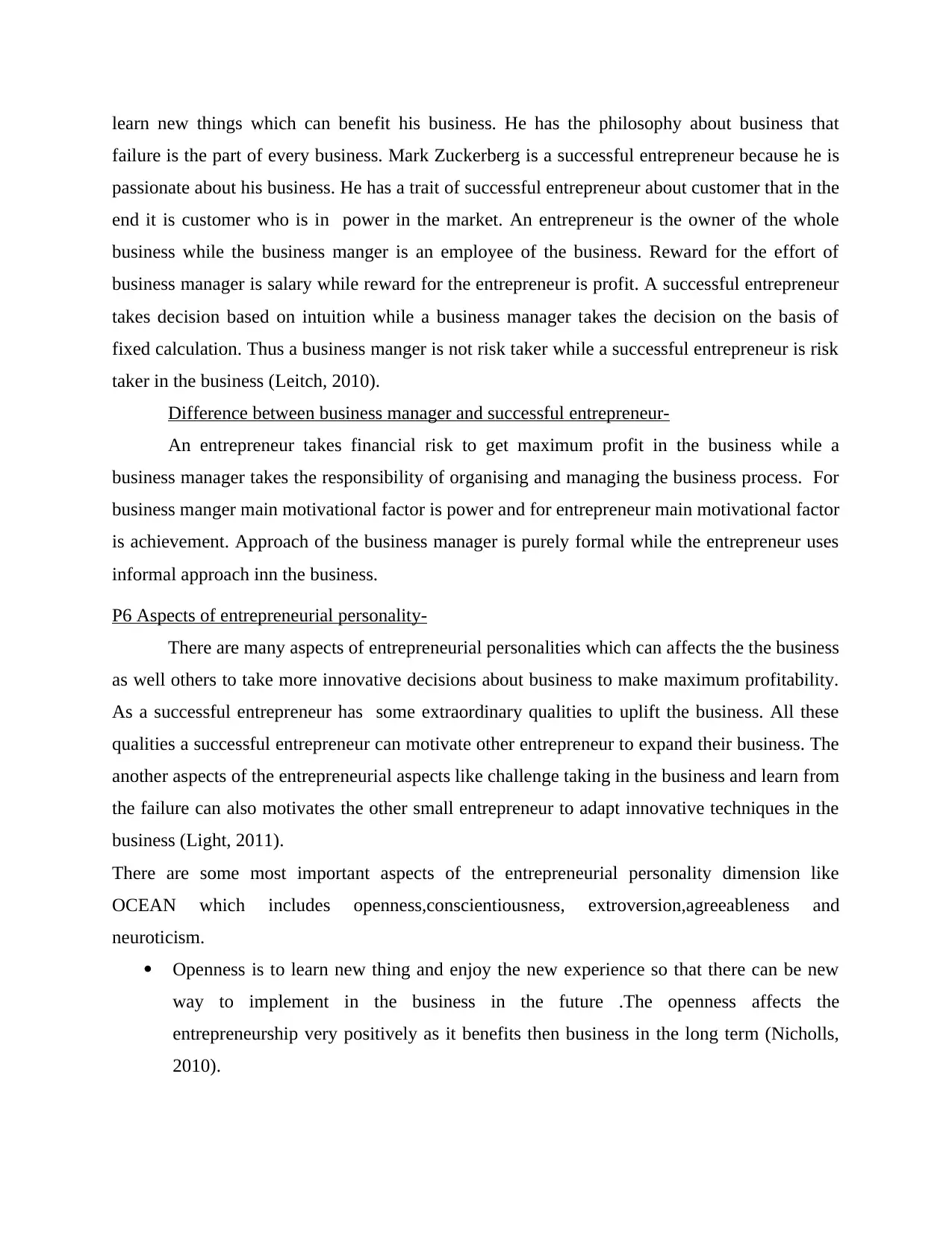
learn new things which can benefit his business. He has the philosophy about business that
failure is the part of every business. Mark Zuckerberg is a successful entrepreneur because he is
passionate about his business. He has a trait of successful entrepreneur about customer that in the
end it is customer who is in power in the market. An entrepreneur is the owner of the whole
business while the business manger is an employee of the business. Reward for the effort of
business manager is salary while reward for the entrepreneur is profit. A successful entrepreneur
takes decision based on intuition while a business manager takes the decision on the basis of
fixed calculation. Thus a business manger is not risk taker while a successful entrepreneur is risk
taker in the business (Leitch, 2010).
Difference between business manager and successful entrepreneur-
An entrepreneur takes financial risk to get maximum profit in the business while a
business manager takes the responsibility of organising and managing the business process. For
business manger main motivational factor is power and for entrepreneur main motivational factor
is achievement. Approach of the business manager is purely formal while the entrepreneur uses
informal approach inn the business.
P6 Aspects of entrepreneurial personality-
There are many aspects of entrepreneurial personalities which can affects the the business
as well others to take more innovative decisions about business to make maximum profitability.
As a successful entrepreneur has some extraordinary qualities to uplift the business. All these
qualities a successful entrepreneur can motivate other entrepreneur to expand their business. The
another aspects of the entrepreneurial aspects like challenge taking in the business and learn from
the failure can also motivates the other small entrepreneur to adapt innovative techniques in the
business (Light, 2011).
There are some most important aspects of the entrepreneurial personality dimension like
OCEAN which includes openness,conscientiousness, extroversion,agreeableness and
neuroticism.
Openness is to learn new thing and enjoy the new experience so that there can be new
way to implement in the business in the future .The openness affects the
entrepreneurship very positively as it benefits then business in the long term (Nicholls,
2010).
failure is the part of every business. Mark Zuckerberg is a successful entrepreneur because he is
passionate about his business. He has a trait of successful entrepreneur about customer that in the
end it is customer who is in power in the market. An entrepreneur is the owner of the whole
business while the business manger is an employee of the business. Reward for the effort of
business manager is salary while reward for the entrepreneur is profit. A successful entrepreneur
takes decision based on intuition while a business manager takes the decision on the basis of
fixed calculation. Thus a business manger is not risk taker while a successful entrepreneur is risk
taker in the business (Leitch, 2010).
Difference between business manager and successful entrepreneur-
An entrepreneur takes financial risk to get maximum profit in the business while a
business manager takes the responsibility of organising and managing the business process. For
business manger main motivational factor is power and for entrepreneur main motivational factor
is achievement. Approach of the business manager is purely formal while the entrepreneur uses
informal approach inn the business.
P6 Aspects of entrepreneurial personality-
There are many aspects of entrepreneurial personalities which can affects the the business
as well others to take more innovative decisions about business to make maximum profitability.
As a successful entrepreneur has some extraordinary qualities to uplift the business. All these
qualities a successful entrepreneur can motivate other entrepreneur to expand their business. The
another aspects of the entrepreneurial aspects like challenge taking in the business and learn from
the failure can also motivates the other small entrepreneur to adapt innovative techniques in the
business (Light, 2011).
There are some most important aspects of the entrepreneurial personality dimension like
OCEAN which includes openness,conscientiousness, extroversion,agreeableness and
neuroticism.
Openness is to learn new thing and enjoy the new experience so that there can be new
way to implement in the business in the future .The openness affects the
entrepreneurship very positively as it benefits then business in the long term (Nicholls,
2010).
⊘ This is a preview!⊘
Do you want full access?
Subscribe today to unlock all pages.

Trusted by 1+ million students worldwide
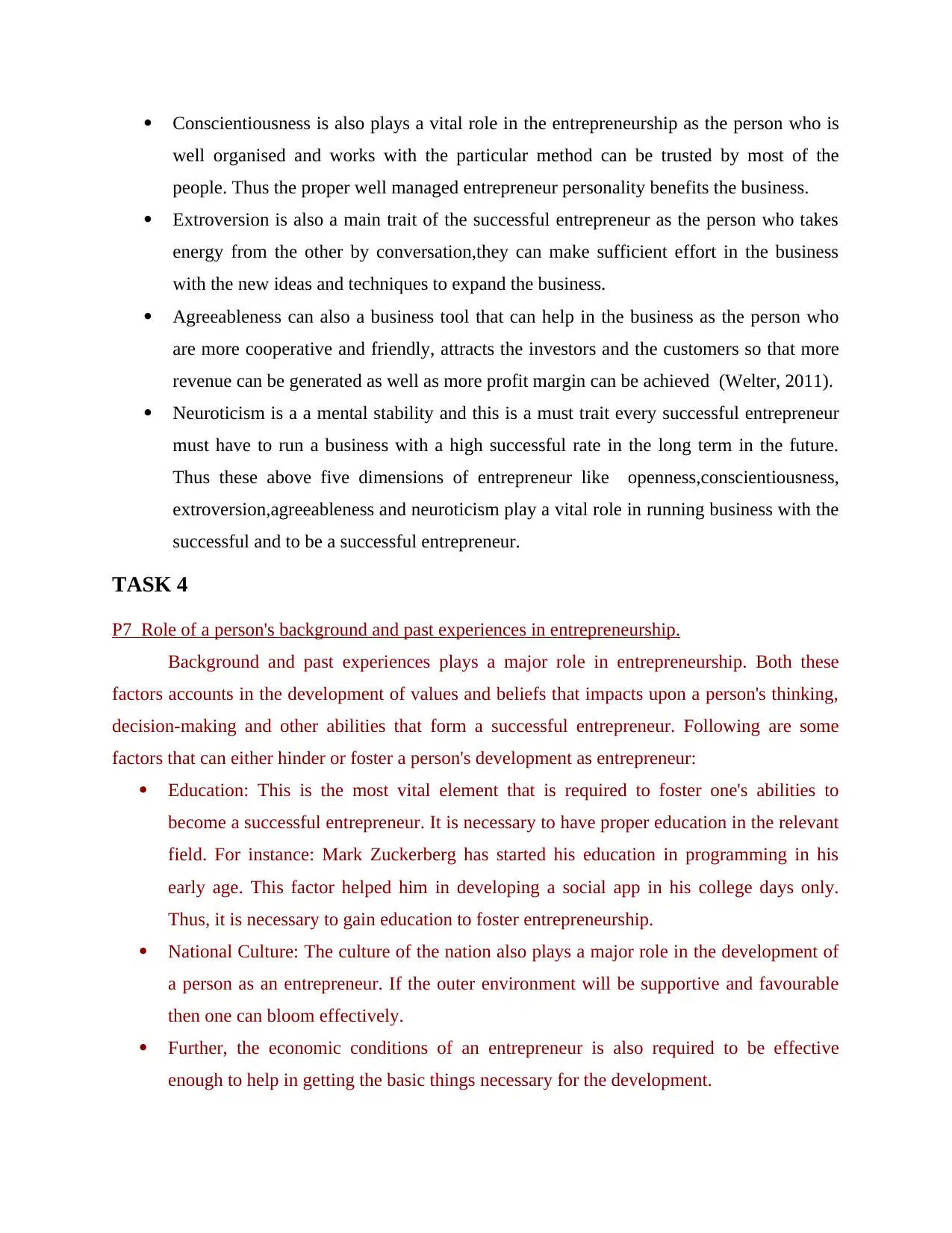
Conscientiousness is also plays a vital role in the entrepreneurship as the person who is
well organised and works with the particular method can be trusted by most of the
people. Thus the proper well managed entrepreneur personality benefits the business.
Extroversion is also a main trait of the successful entrepreneur as the person who takes
energy from the other by conversation,they can make sufficient effort in the business
with the new ideas and techniques to expand the business.
Agreeableness can also a business tool that can help in the business as the person who
are more cooperative and friendly, attracts the investors and the customers so that more
revenue can be generated as well as more profit margin can be achieved (Welter, 2011).
Neuroticism is a a mental stability and this is a must trait every successful entrepreneur
must have to run a business with a high successful rate in the long term in the future.
Thus these above five dimensions of entrepreneur like openness,conscientiousness,
extroversion,agreeableness and neuroticism play a vital role in running business with the
successful and to be a successful entrepreneur.
TASK 4
P7 Role of a person's background and past experiences in entrepreneurship.
Background and past experiences plays a major role in entrepreneurship. Both these
factors accounts in the development of values and beliefs that impacts upon a person's thinking,
decision-making and other abilities that form a successful entrepreneur. Following are some
factors that can either hinder or foster a person's development as entrepreneur:
Education: This is the most vital element that is required to foster one's abilities to
become a successful entrepreneur. It is necessary to have proper education in the relevant
field. For instance: Mark Zuckerberg has started his education in programming in his
early age. This factor helped him in developing a social app in his college days only.
Thus, it is necessary to gain education to foster entrepreneurship.
National Culture: The culture of the nation also plays a major role in the development of
a person as an entrepreneur. If the outer environment will be supportive and favourable
then one can bloom effectively.
Further, the economic conditions of an entrepreneur is also required to be effective
enough to help in getting the basic things necessary for the development.
well organised and works with the particular method can be trusted by most of the
people. Thus the proper well managed entrepreneur personality benefits the business.
Extroversion is also a main trait of the successful entrepreneur as the person who takes
energy from the other by conversation,they can make sufficient effort in the business
with the new ideas and techniques to expand the business.
Agreeableness can also a business tool that can help in the business as the person who
are more cooperative and friendly, attracts the investors and the customers so that more
revenue can be generated as well as more profit margin can be achieved (Welter, 2011).
Neuroticism is a a mental stability and this is a must trait every successful entrepreneur
must have to run a business with a high successful rate in the long term in the future.
Thus these above five dimensions of entrepreneur like openness,conscientiousness,
extroversion,agreeableness and neuroticism play a vital role in running business with the
successful and to be a successful entrepreneur.
TASK 4
P7 Role of a person's background and past experiences in entrepreneurship.
Background and past experiences plays a major role in entrepreneurship. Both these
factors accounts in the development of values and beliefs that impacts upon a person's thinking,
decision-making and other abilities that form a successful entrepreneur. Following are some
factors that can either hinder or foster a person's development as entrepreneur:
Education: This is the most vital element that is required to foster one's abilities to
become a successful entrepreneur. It is necessary to have proper education in the relevant
field. For instance: Mark Zuckerberg has started his education in programming in his
early age. This factor helped him in developing a social app in his college days only.
Thus, it is necessary to gain education to foster entrepreneurship.
National Culture: The culture of the nation also plays a major role in the development of
a person as an entrepreneur. If the outer environment will be supportive and favourable
then one can bloom effectively.
Further, the economic conditions of an entrepreneur is also required to be effective
enough to help in getting the basic things necessary for the development.
Paraphrase This Document
Need a fresh take? Get an instant paraphrase of this document with our AI Paraphraser
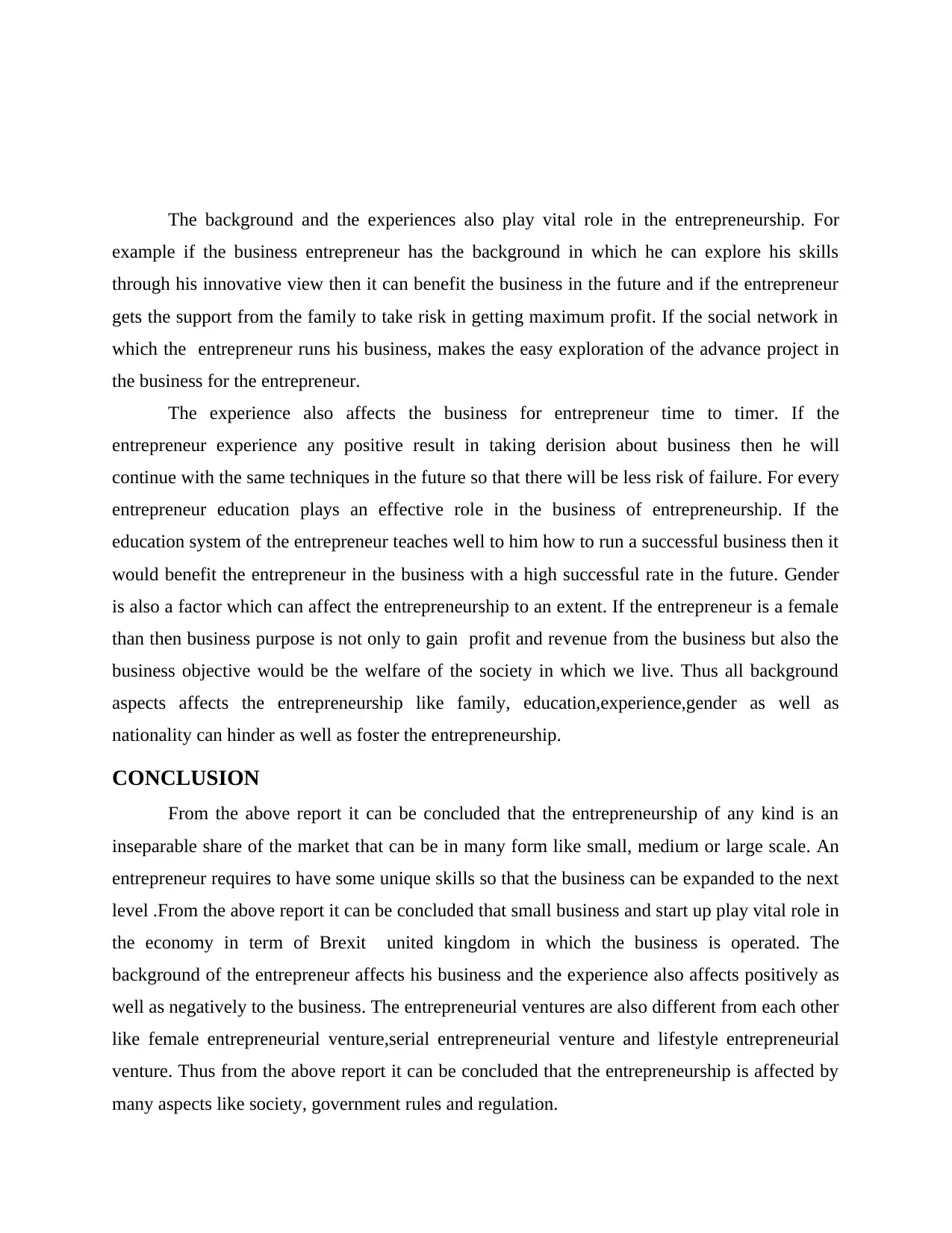
The background and the experiences also play vital role in the entrepreneurship. For
example if the business entrepreneur has the background in which he can explore his skills
through his innovative view then it can benefit the business in the future and if the entrepreneur
gets the support from the family to take risk in getting maximum profit. If the social network in
which the entrepreneur runs his business, makes the easy exploration of the advance project in
the business for the entrepreneur.
The experience also affects the business for entrepreneur time to timer. If the
entrepreneur experience any positive result in taking derision about business then he will
continue with the same techniques in the future so that there will be less risk of failure. For every
entrepreneur education plays an effective role in the business of entrepreneurship. If the
education system of the entrepreneur teaches well to him how to run a successful business then it
would benefit the entrepreneur in the business with a high successful rate in the future. Gender
is also a factor which can affect the entrepreneurship to an extent. If the entrepreneur is a female
than then business purpose is not only to gain profit and revenue from the business but also the
business objective would be the welfare of the society in which we live. Thus all background
aspects affects the entrepreneurship like family, education,experience,gender as well as
nationality can hinder as well as foster the entrepreneurship.
CONCLUSION
From the above report it can be concluded that the entrepreneurship of any kind is an
inseparable share of the market that can be in many form like small, medium or large scale. An
entrepreneur requires to have some unique skills so that the business can be expanded to the next
level .From the above report it can be concluded that small business and start up play vital role in
the economy in term of Brexit united kingdom in which the business is operated. The
background of the entrepreneur affects his business and the experience also affects positively as
well as negatively to the business. The entrepreneurial ventures are also different from each other
like female entrepreneurial venture,serial entrepreneurial venture and lifestyle entrepreneurial
venture. Thus from the above report it can be concluded that the entrepreneurship is affected by
many aspects like society, government rules and regulation.
example if the business entrepreneur has the background in which he can explore his skills
through his innovative view then it can benefit the business in the future and if the entrepreneur
gets the support from the family to take risk in getting maximum profit. If the social network in
which the entrepreneur runs his business, makes the easy exploration of the advance project in
the business for the entrepreneur.
The experience also affects the business for entrepreneur time to timer. If the
entrepreneur experience any positive result in taking derision about business then he will
continue with the same techniques in the future so that there will be less risk of failure. For every
entrepreneur education plays an effective role in the business of entrepreneurship. If the
education system of the entrepreneur teaches well to him how to run a successful business then it
would benefit the entrepreneur in the business with a high successful rate in the future. Gender
is also a factor which can affect the entrepreneurship to an extent. If the entrepreneur is a female
than then business purpose is not only to gain profit and revenue from the business but also the
business objective would be the welfare of the society in which we live. Thus all background
aspects affects the entrepreneurship like family, education,experience,gender as well as
nationality can hinder as well as foster the entrepreneurship.
CONCLUSION
From the above report it can be concluded that the entrepreneurship of any kind is an
inseparable share of the market that can be in many form like small, medium or large scale. An
entrepreneur requires to have some unique skills so that the business can be expanded to the next
level .From the above report it can be concluded that small business and start up play vital role in
the economy in term of Brexit united kingdom in which the business is operated. The
background of the entrepreneur affects his business and the experience also affects positively as
well as negatively to the business. The entrepreneurial ventures are also different from each other
like female entrepreneurial venture,serial entrepreneurial venture and lifestyle entrepreneurial
venture. Thus from the above report it can be concluded that the entrepreneurship is affected by
many aspects like society, government rules and regulation.
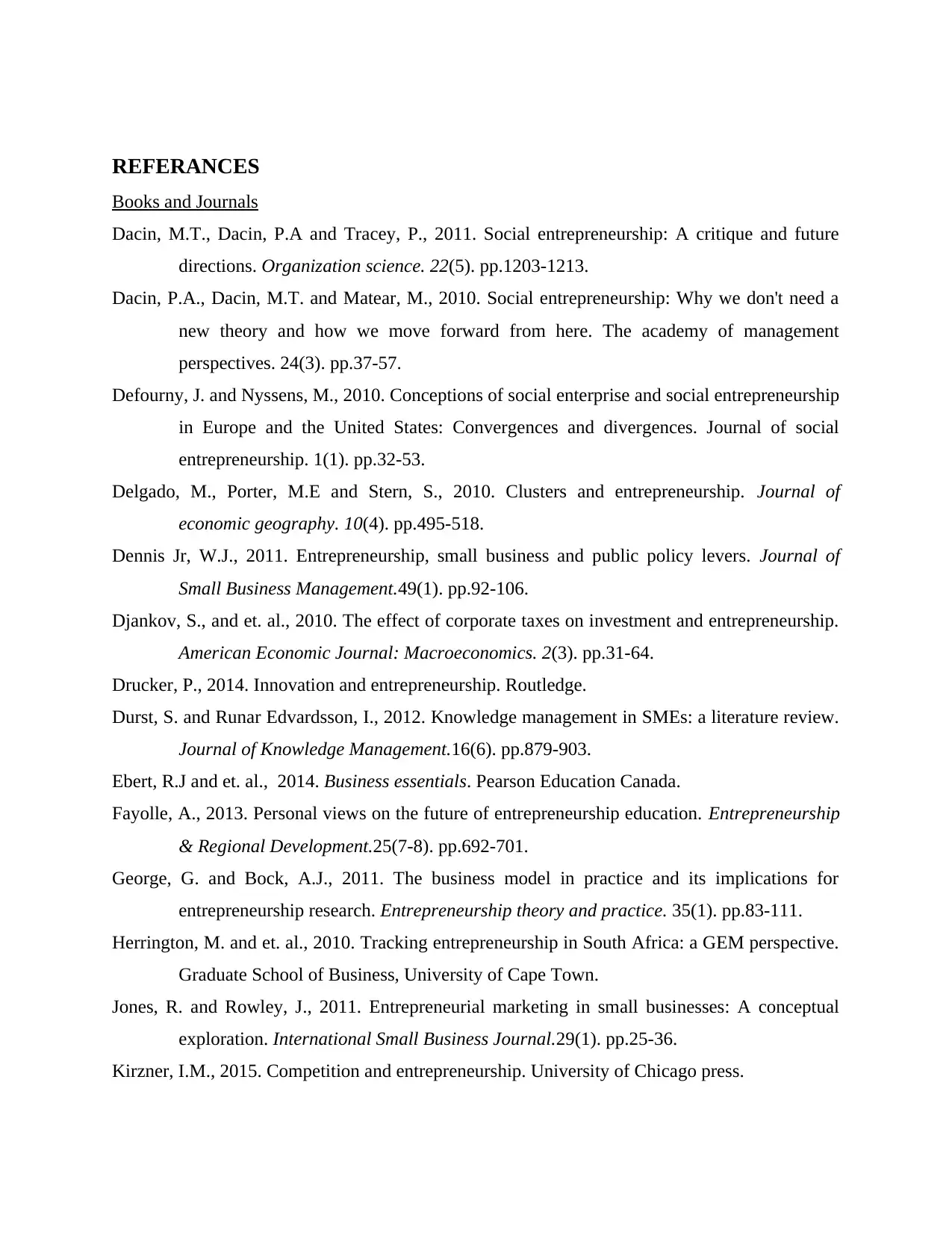
REFERANCES
Books and Journals
Dacin, M.T., Dacin, P.A and Tracey, P., 2011. Social entrepreneurship: A critique and future
directions. Organization science. 22(5). pp.1203-1213.
Dacin, P.A., Dacin, M.T. and Matear, M., 2010. Social entrepreneurship: Why we don't need a
new theory and how we move forward from here. The academy of management
perspectives. 24(3). pp.37-57.
Defourny, J. and Nyssens, M., 2010. Conceptions of social enterprise and social entrepreneurship
in Europe and the United States: Convergences and divergences. Journal of social
entrepreneurship. 1(1). pp.32-53.
Delgado, M., Porter, M.E and Stern, S., 2010. Clusters and entrepreneurship. Journal of
economic geography. 10(4). pp.495-518.
Dennis Jr, W.J., 2011. Entrepreneurship, small business and public policy levers. Journal of
Small Business Management.49(1). pp.92-106.
Djankov, S., and et. al., 2010. The effect of corporate taxes on investment and entrepreneurship.
American Economic Journal: Macroeconomics. 2(3). pp.31-64.
Drucker, P., 2014. Innovation and entrepreneurship. Routledge.
Durst, S. and Runar Edvardsson, I., 2012. Knowledge management in SMEs: a literature review.
Journal of Knowledge Management.16(6). pp.879-903.
Ebert, R.J and et. al., 2014. Business essentials. Pearson Education Canada.
Fayolle, A., 2013. Personal views on the future of entrepreneurship education. Entrepreneurship
& Regional Development.25(7-8). pp.692-701.
George, G. and Bock, A.J., 2011. The business model in practice and its implications for
entrepreneurship research. Entrepreneurship theory and practice. 35(1). pp.83-111.
Herrington, M. and et. al., 2010. Tracking entrepreneurship in South Africa: a GEM perspective.
Graduate School of Business, University of Cape Town.
Jones, R. and Rowley, J., 2011. Entrepreneurial marketing in small businesses: A conceptual
exploration. International Small Business Journal.29(1). pp.25-36.
Kirzner, I.M., 2015. Competition and entrepreneurship. University of Chicago press.
Books and Journals
Dacin, M.T., Dacin, P.A and Tracey, P., 2011. Social entrepreneurship: A critique and future
directions. Organization science. 22(5). pp.1203-1213.
Dacin, P.A., Dacin, M.T. and Matear, M., 2010. Social entrepreneurship: Why we don't need a
new theory and how we move forward from here. The academy of management
perspectives. 24(3). pp.37-57.
Defourny, J. and Nyssens, M., 2010. Conceptions of social enterprise and social entrepreneurship
in Europe and the United States: Convergences and divergences. Journal of social
entrepreneurship. 1(1). pp.32-53.
Delgado, M., Porter, M.E and Stern, S., 2010. Clusters and entrepreneurship. Journal of
economic geography. 10(4). pp.495-518.
Dennis Jr, W.J., 2011. Entrepreneurship, small business and public policy levers. Journal of
Small Business Management.49(1). pp.92-106.
Djankov, S., and et. al., 2010. The effect of corporate taxes on investment and entrepreneurship.
American Economic Journal: Macroeconomics. 2(3). pp.31-64.
Drucker, P., 2014. Innovation and entrepreneurship. Routledge.
Durst, S. and Runar Edvardsson, I., 2012. Knowledge management in SMEs: a literature review.
Journal of Knowledge Management.16(6). pp.879-903.
Ebert, R.J and et. al., 2014. Business essentials. Pearson Education Canada.
Fayolle, A., 2013. Personal views on the future of entrepreneurship education. Entrepreneurship
& Regional Development.25(7-8). pp.692-701.
George, G. and Bock, A.J., 2011. The business model in practice and its implications for
entrepreneurship research. Entrepreneurship theory and practice. 35(1). pp.83-111.
Herrington, M. and et. al., 2010. Tracking entrepreneurship in South Africa: a GEM perspective.
Graduate School of Business, University of Cape Town.
Jones, R. and Rowley, J., 2011. Entrepreneurial marketing in small businesses: A conceptual
exploration. International Small Business Journal.29(1). pp.25-36.
Kirzner, I.M., 2015. Competition and entrepreneurship. University of Chicago press.
⊘ This is a preview!⊘
Do you want full access?
Subscribe today to unlock all pages.

Trusted by 1+ million students worldwide
1 out of 13
Related Documents
Your All-in-One AI-Powered Toolkit for Academic Success.
+13062052269
info@desklib.com
Available 24*7 on WhatsApp / Email
![[object Object]](/_next/static/media/star-bottom.7253800d.svg)
Unlock your academic potential
Copyright © 2020–2026 A2Z Services. All Rights Reserved. Developed and managed by ZUCOL.





